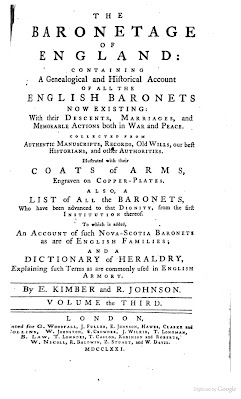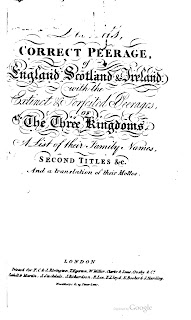The Regency Time Period
I have been slagging through Elegant Etiquette in the Nineteenth Century by Mallory James. It's like doing Manners Math. A person's title determines their rank in society and thus, precedence. Precedence boils down to who goes first: who speaks first, who enters or leaves a room first, who enters or leaves a carriage first and where they sit in the carriage (forward facing or backwards facing), etc. Their title determines how they are addressed and how introductions are made--IF they may be made. Apart from the royal family, a duke is the highest rank. A duke and an earl in the same room is obvious. The duke is addressed as "Your Grace" and introduced to the earl (Lord So-And-So). Easy-peazy. UNLESS . . . there are two earls. Then the duke is introduced to the eldest earl--UNLESS, the older lord's family is more recently given the title of earl than the younger earl; in which case the younger earl is introduced first.
I have temporarily DNF-ed (Did Not Finish) Elegant Etiquette and just binge-watched a bunch of Octavia Cox. She breaks it down and makes it easier to understand in What CLASS Are The Bingleys. Here's a summary of GENERAL RANKINGS:
- Nobility/Aristocracy = own estates/land, titled. House of Lords
- Gentry = own land/estates, but not titled. House of Commons (but elected)
- Trade/Merchants/Commercial People = often wealthy, but unless knighted, not called "Sir Anything."
- Common Trades = butcher, baker, blacksmiths, etc.
- Peasantry = everyone else; many become factory workers in the Industrial Revolution.
RANKING of NOBILITY/ARISTOCRACY; members of the Peerage:
- King
- Prince
- Duke
- Marquess
- Earl
- Viscount
- Baron
"But I have lots of money!" It doesn't matter.
Wealth was important, but even if you made more money than someone in the aristocracy, you still adhered to societal conventions. There were some professions in the middle class that were more desirable than others. For example, even if a tanner made way more than a lawyer, the lawyer had greater rank, status and privilege. In Persuasion, Mary objects to Henrietta's interest in her cousin Mr. Hayter because he wants to be a clergyman. He's educated, will inherit his family's estate as the eldest, but with no title, he's not high-status enough for someone related to her. She doesn't really care about Henrietta, it's Henrietta's association to Mary and her family that she cares about. On the other hand, if Mr. Hayter were to be an archbishop, then he would be higher up--not enough for Mary, I'm sure!
"And all that remained was to marshall themselves and proceed into the Concert Room, and be of all consequence in their power."
Speaking of Mary, let's talk ladies. Something that Jane Austen emphasizes is Mary's preoccupation with precedence over her mother-in-law Mrs. Musgrove, because her father was born a baron. So she was born into the aristocracy and thus, superior. This means she's the first to enter a carriage, the first to enter into dinner. She would be "higher" up than Mrs. Harville, who is only married to a sea captain, with no title or land. The same rules for gentlemen apply to ladies; the superior lady is introduced to the lower-ranking woman. But why would Mary be so obsessed? Look to her upbringing. In addition to vanity, her father is obsessed about status, title, rank, and precedence.
From the age of 16, Elizabeth as the eldest, was the lady of the house after Lady Elliot died. This meant that she was first after her father, UNLESS Lady Russell were present, in which case, she followed behind Lady Russell because she was a lady and older. Prior to being married, Mary would have lived for years having to trail behind Elizabeth as the eldest, but also Anne because she was older, too. So there would be Mary bringing up the rear, which must have vexed her greatly. She would have felt a smug satisfaction on being able to go ahead of Anne after she married--not that Anne would have cared.
When Anne marries, "She had something to suffer . . . in seeing Anne restored to the rights of seniority" but she consoles herself that "Anne had no Uppercross Hall before her, no landed estate, no headship of a family; and if they could but keep Captain Wentworth from being made a baronet, she would not change situations with Anne." In other words, she's still better than Anne in status, and thus wins. Even if Captain Wentworth does buy an estate and thus establish himself as landed gentry, he's still not "as good" as someone who's titled.
INTRODUCTIONS
Introductions were a big deal. You didn't introduce yourself; you had to have a mutual acquaintance introduce you. And it would behoove that mutual acquaintance to take it seriously lest he besmirch his own name if something goes awry. You would need permission from the superior ranking person to make the introduction. If you'll pardon a Pride & Prejudice reference, this is why people didn't just go up to Mr. Darcy at the Assembly Hall and introduce themselves. And he was clearly not seeking to be introduced to anyone there. This is also why it was such an affront for Mr. Collins to introduce himself to Mr. Darcy at the Netherfield Ball. Such impudence! Who did he think he was, just because his house was divided by "only a lane" to Lady Catherine's estate?
There was also a whole set of rules for walking about towne. Lydia yelling out to Denny in Meryton was a clear indication early on about her lack of propriety and character. It's why she was admonished by her older sisters. Jane Austen was showing the reader her lack of good judgement and poor conduct early on. We knew Lydia was going to be in trouble!
HISTORY HAPPENED
Beyond the accepted social customs and acknowledgement of rank, there is also history happening. Jane Austen never specifically mentions the Napoleonic Wars (1803-1815) but soldiers and naval officers "are in her head!" Or at least peppered throughout her novels. Going into the navy or joining a regiment was a career option for non-first born heirs and men with no other clear career path. Jane Austen had brothers in the navy, so she was well-familiar with the jargon and culture of naval society.
TYING IT ALL TOGETHER
Now that we understand title, rank, precedence, status and history, let us revisit what Jane Austen says of Sir Walter Elliot, shall we?
"Sir Walter Elliot, of Kellynch Hall . . . never took up any book but the Baronetage." This book was a list of all the baronets in the country and was his source of pride and superiority over others. He was SIR Walter Elliot and it said so in this very-important book! Not only was his family listed, but he "improved" it by adding additional information of himself & family: births, deaths, marriages. This might not seem like a big deal, but this is what people did in their family bibles--which we know Sir Walter Elliot does NOT read! So the Baronetage is essentially his bible.He dismisses other people based solely on a lack of title; they are not entitled like he is. What Jane Austen and readers would have known is that the chest-puffery of Sir Walter Elliot makes him look even more of a vapid buffoon than he already is. He is not a baron (lowest of nobility/aristocracy), but a baronet. He's titled, and acts as if he's aristocracy, but he's not. In fact, there are two books: The Baronetage, and the Peerage, which is a separate list of the different levels of aristocracy.
So what is a baronet?
A baronet is in between the aristocracy and the gentry. It is a title not in the ranks of the aristocracy, and has no political power. The Baronetcy was created by King James the First who sold this new title for a thousand pounds per man.
King James: It's 1611. I need money for the soldier thing happening in Ireland. I know! I'll send out a sales force to canvas the country and sell status to rich people.
Joe Merchant: I'd like a baronetcy, please.
King's Sales Guy: Do you have a thousand pounds? (269271.55 pounds or $346,156.33 today)
Joe Merchant: Here it is. And does this title inherit to little Joe Junior?
King's Sales Guy: Thank you, Sir Joe Merchant and, er, any future Joe Merchant descendants.
Joe Merchant: I'll just be on my way to Parliament . . .
King's Sales Guy: Nope. You have no political power.
Joe Merchant: But I'm a baron!
King's Sales Guy: Baron-ET. But the knighted guy down the street can't pass down his knighthood to his son. YOU can. His son will just be "Mister."
Joe Merchant: Right! Off to buy an estate of at least 500 acres so I can become gentry!
Sir Walter Elliot has a large house but he doesn't grow crops or manage land and he certainly doesn't have 500 acres. He is not landed gentry, he is not aristocracy. He is in between. He could stand to be a bit more humble and kind to others. That is one of the points Jane Austen makes about him. At the end of the book, untitled Captain Wentworth helps Anne's friend Mrs. Smith out her financial predicament. He does what William Elliot refused to do, and essentially caused. Sir Walter Elliot would never have even considered helping, because she was a nobody. This is not to diss a baronet, but specifically Sir Walter Elliot because he's such a judgey blowhard who thinks himself superior when . . . he's just not. He's just entitled--literally and figuratively!
For a few laughs, here's Eddie Izzard explain the royals:
MORE RESOURCES:
Status, Rank & Class in Jane Austen's Novels by John Mullan.
Now, in the 21st century, Sir Walter Elliot could consult the Debretts website.

.jpg)


No comments:
Post a Comment